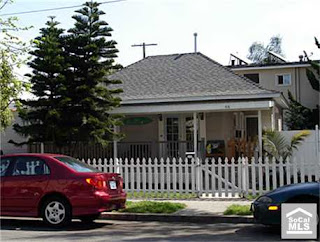In The Year 2000...
Conan dons a black robe and a futuristic collar, and cuts the lights. With a flashlight underneath his chin (like telling a ghost story at camp), he makes wacky predictions about what will take place in the future. It's absolutely hilarious.

"In an effort to make fast food even faster, McDonald's will begin pumping their food directly into customers' stomachs. To keep pace Wendy's will pump their food directly into people's toilets."
Anyhow, the bit was created before the year 2000, but the title stayed even after the millennium. It's a little off-putting to watch a bit premised on what will happen in the future, even though we are already 8 years past The Year 2000. But still a classic bit.
The reason that applies to this post is because there is so much debate about what the future holds, when we will hit a pricing bottom in housing, and the "price year" the bottom will correspond to. We all know that currently, a vast majority of houses in Long Beach are only able to sell when 2004 prices are offered. The idea that a seller can get what they paid in '05, '06, or '07 is the equivalent of wishing in one hand, crapping in the other, and seeing which gets filled first. Those days are done and only the most delusional and desperate disagree.
And 2004 pricing is quickly becoming an endangered species, as many homes are dropping into 2003 territory to attract buyers. So where does it all stop? If I could predict the future, I'd make Richie Rich look like a meth addict living under the 710 freeway, but my instincts tell me we have a long way to go.
I believe this bubble really got started around the year 2000. That's when many of the obscure, wacky loan products became more available and when annual appreciation first started to take off. The dot-com money, freshly burned from that bubble, was looking for a home and found it in home investment. Around 2003-2004 the Adjustable Rate Mortgages and other suicide loans came into favor, deadbeats suddenly became viable homeownership candidates, and the bubble began to get out of control.
There is little doubt in my mind that most bubble "equity" built up between 2000 and the peak in 2006 will evaporate. Poof! All economic data (and common sense) indicates this housing crash will overshoot fundamentals on the way down.
That's why I think we will return to 2000-2001 prices in most parts of Long Beach. There are a lot of reasons why I believe that, but an obvious one is because that's the last time rents and mortgages were near parity. Not only that, but with rising interest rates, significantly increased down payment and income verification requirements, stagnant wages, job losses, rising food and fuel (yes, there has been some minor relief on gas, but it's still very expensive compared to last year) costs, there aren't many people who will qualify for $350 per square foot in downtown. To attract buyers, prices will have to come down dramatically.
It is worth noting that some of my friends and co-workers think I'm certifiably nuts. Just a doom-and-gloomer who is rooting for things to fall apart. When I share my belief that we will see 2000-2001 prices in most of LB during the next few years, people look at me like I'm crazy. But, as Dr. Housing Bubble so convincingly pointed out, there are at least 10 reasons why California is a long way from hitting a pricing bottom.
Perhaps this property can provide some insight into my opinions:

Address: 418 Nebraska, 90802
Asking Price: $249,900
Year Built: In The Year 1900
Size: 2 beds, 1 bath, 836 sq. ft.
$/Sq. Ft.: $299
Purchase price: $442,000
Purchase date: 3/2006
MLS#: P629723
On Redfin: 132 days
Down Payment: $50,000
Monthly Payment: $1,600
Income Requirement: $62,000
Description: Vintage cottage near downtown and the beach with upgraded windows, copper plumbing, covered deck, fence, landscaping and more. Bright open kitchen,large bedrooms and inside laundry make this a great starter home or investment property.

Yikes. These pictures give me the creeps. Just imagining the sheer amount of dust in this place makes me want to sneeze.


On the plus side, they re-plumbed the place with copper piping. All of these ancient houses in Long Beach need that upgrade, and it shows that the owners at least gave half a crap about it during their tenure. New windows is a plus. Furthermore, the kitchen looks surprisingly decent:
If it was closer to Ocean and on the good side of Cherry, with a little elbow grease this could be a cool little beach bungalow and would make a decent purchase.
This tiny relic, if you can believe it, was purchased in March of 2006 for a whopping $442,000. Good God, man. That's $517 per square foot in what I consider to be an undesirable area of Long Beach (especially for that much money). Setting aside my suspicions of fraud, this seems to be a case of a family that bit off way more than they could chew. Judging by their pricing strategy, it looks like they are very desperate to get out of this financial trap.
Mar 30, 2008 - $350,000
Jul 18, 2008 - $299,900
Aug 08, 2008 - $249,900
On the fast track to capitulation! When the property was initially listed, just two years after purchase, they already knew it was a losing proposition. Including commissions, the original asking price represented a $100,000 loss. Bada-bing!
In July, hoping for the summer selling season to relieve them of their crushing mortgage payment (around $3,000 for this shack!! What do you suppose it rents for? Less than half that?), they bent over for another $50,000. In August, another $50,000 discount came and here we are today, still unsold at what is actually approaching a reasonable asking price of $249,900. That represents a loss of $200,000 after commissions!
[Can someone please explain to me how a house can sell for a $200,000 haircut without it being a short sale? The interior decor doesn't exactly indicate Rockefellers live here--how is it possible for them to absorb this loss themselves? There is no indication the bank owns it either. These types of listings are enigmas to me.]
And the reason it hasn't sold? One guess is a buyer's thinking: Well heck, if they've managed to chop off 50 grand a month for the last two months, what would stop them from lopping another 50k in September?
Again, we're back to the original question on every buyer's (and seller's, I guess) mind: When will the bleeding stop?
To find out the "price year" we will reach before fundamentals are met again and the carnage halts, let's first look at the sales history:
Jul 26, 1999 - $115,000
Nov 24, 2004 - $325,000 (21.5% annual appreciation)
Mar 17, 2006 - $442,000 (26.5% annual appreciation)
This example is perfect because the earliest purchase date on record was in 1999, before the bubble really took off.
By asking $249,900, they've clearly surpassed the 2006 purchase price. As I said, most homes selling in Long Beach these days are at 2004 prices, but it looks like this home has already undercut the '04 purchase price by -$75,000!
Even if we're really optimistic and pretend the annual appreciation rate of 21.5% between 1999 and 2004 was real, $249,000 (a price at which the house is still not selling) is below 2003 pricing!
Ah, but now that the housing bubble has burst, we all know a 21.5-26.5% annual appreciation rate was not of this world. How do you calculate a "year price" when prices during the last several years were so egregiously inflated?
One way to gain perspective is to calculate "year value" by starting at 1999 and applying a more realistic appreciation rate. If we use a very generous (especially for this neighborhood) 5% annual appreciation rate, and compound that from the 1999 purchase price until today, the actual 2008 value would be $212,384. Still overpriced by nearly $40,000, but getting there.
Trying to predict what "year price" will be reached reinforces the importance of using basic investing fundamentals such as Rent vs. Buy. The Rent vs. Buy calculation, assuming a rent of $1,400 x 160 grm = present value of $224,000. That's pretty close to our "year value" calculation. And that would put this house firmly in 2002 pricing--even assuming that ridiculous 21.5% annual appreciation was somehow legitimate.
And considering the Price to Income ratio is still WAY OFF and lenders are requiring much larger down payments, there is more room to drop.
My head is spinning from all these numbers but the overall point is that this little house, like many others in Long Beach, has left 2007, 2006, 2005, and 2004 prices--whether inflated or not--in the dust. And quickly! And I simply don't see any possibility for that to stop any time soon.
For those who say, "You're dreaming if you think we're going back to 2000 prices," given the fact that we just erased four years (or more) of equity in just a matter of months, what on earth makes you think the bottom is here, and that the bleeding will magically stop?

Comments
Post a Comment